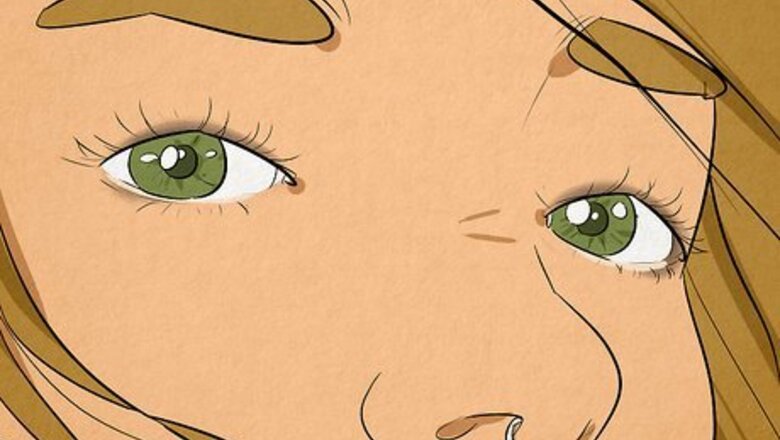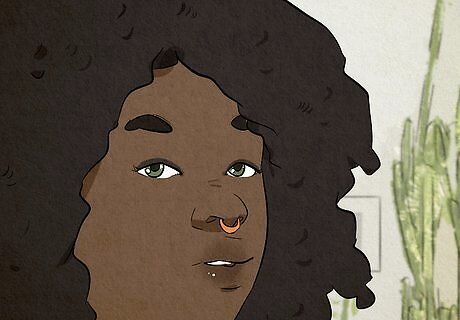
views
- A septum piercing signifies self-expression, uniqueness, and rebellion. Spiritually, it’s believed to help you communicate with the divine and your higher self.
- Humans have been piercing their septums for at least 46,000 years. To Indigenous Australians, they represent adulthood, while in India, they signify marriage.
- Septum piercings are not tied to any gender or sexuality. What a septum piercing means is up to you: it can celebrate your identity or show off your individuality.
Spiritual Meanings of a Septum Piercing

A septum piercing symbolizes self-expression and individuality. The number one thing that a septum ring says about you is that you’re proud of your uniqueness. Septum piercings are important to many regions, like India and Africa, so some people get their septum pierced to feel connected to their culture. Other people simply see this piercing as a beautiful jewelry piece to express their personality and style. Either way, a septum piercing celebrates your identity. A septum piercing is often seen as a sign of rebellion, whether you’re expressing your bodily autonomy or rejecting the status quo. Septum piercings became popular in the West during the 1960s hippie movement, so they’re also seen as a counterculture symbol. They’re popular in punk, goth, and other subcultures.

Septum piercings might help you connect with your spirituality. The septum, or the point between your nostrils, is believed to be your spiritual center. When you pierce your septum, you might open up your connection with the spiritual world and your higher self. This is thought to help you communicate with the divine and heighten your spiritual awareness. Septum piercings are also believed to provide spiritual protection from negative spirits and energy.
Cultural Significance of Septum Piercings

To Indigenous Australians, a septum piercing marks adulthood. Piercing the septum is an ancient practice for Indigenous Australians that is still done today. In the past, jewelry was made out of animal bones that were significant to the tribe or the person’s ancestors. The piercing was then done at a ceremony that symbolized the person’s transition from childhood to adulthood. Septum piercings were also simply seen as ways to beautify men and women. They might have been used to flatten people’s noses, which were deemed beautiful. One of the oldest pieces of jewelry in the world is a kangaroo bone septum piercing that was worn by an Indigenous Australian; the piercing is at least 46,000 years old!

According to Hindu beliefs, septum piercings symbolize marriage. In India, many brides wear septum piercings, or naths, on their wedding day to represent their transition to married life. The nath also has religious significance, as wearing it pays respects to Parvati, the goddess of love, beauty, and motherhood, who blesses the marriage. Septum piercings can also represent spiritual connection and balance. Piercing the septum is believed to open the third eye chakra, which is a spiritual center that symbolizes the power of life. Septum rings also represent marriage in some middle eastern cultures. Men typically give women a nose ring on their wedding day.

The Aztecs and Mayans tied piercings to status and religious rituals. Both the ancient Aztecs and Mayans used septum rings to represent their social hierarchy: priests and nobles wore gold jewelry adorned with gems while commoners wore bone. Piercings weren’t just for decoration though. The Mayans and Aztecs pierced their septums in bloodletting rituals to communicate with and pay their respects to the gods.

To Native Americans, septum piercings represent status and strength. Many Native American tribes wore, and continue to wear, septum piercings to symbolize their social hierarchy. For example, Odawa leaders wore septum rings to signify that they were the head of the tribe. These nose piercings were also believed to bring the wearer strength, courage, and protection, especially in battle.

In Africa, septum piercings are a symbol of status and adulthood. Septum piercings have ancient ties with many African cultures. The piercing was often tied to wealth and hierarchy, with more ornate jewelry signifying a higher status. In countries like Ethiopia, boys got their septums pierced to represent their transition to manhood. Septum piercings are also regarded as spiritual symbols, too. Ancient Egyptians believed that the septum opened up your soul.
What do septum piercings mean for men and women?

For men, septum piercings can symbolize individuality and strength. Many men get septum piercings simply because they like the way they look. The piercings can be a way for them to express their personality and individuality, or to show off their unique style. Septum piercings are often tied to strength and courage, so they might show a man’s bravery to be himself.

For women, septum piercings can represent courage and uniqueness. To many women, getting a septum piercing can be a way to embrace their true selves and feel beautiful. Their nose ring might be a powerful statement of self-love and acceptance no matter what others think. A woman might get her septum pierced to express her style or to reject traditional beauty standards.
Does a septum piercing say anything about your sexuality?

No, septum piercings are not tied to any one sexuality or gender. Septum piercings are for everyone, whether you’re straight, LGBTQ, masculine, feminine, or non-binary. So if you want your nose ring to express your sexuality or gender, that’s completely up to you! Some people might wear a septum ring to show off their pride in being in the LGBTQ community, while others might wear a nose ring to reject traditional gender roles. A septum piercing doesn’t have to mean anything to you, either. If you simply like the look of one, rock it with style and confidence.




















Comments
0 comment